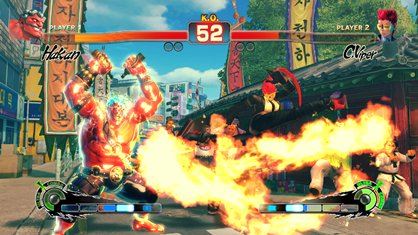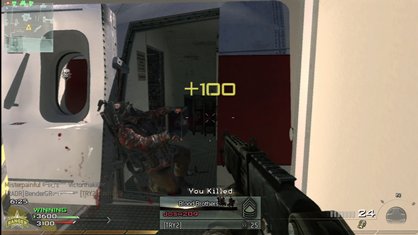Change the way you think to get better at games
Break your psychological chains and rule the virtual world
Learning how to recognize your own skill level will enhance your ability to improve. While it seems simple to say “I’m better than that guy, but worse than this guy,” in fact it’shuman nature to believe we are really good at something we are terrible at. This is known as theDunning-Kruger effect, which states:
The unskilled therefore suffer from illusory superiority, rating their own ability as above average, much higher than in actuality; by contrast, the highly skilled underrate their abilities, suffering from illusory inferiority. This leads to a perverse result where less competent people will rate their own ability higher than more competent people.
Above: American Idol shows the Dunning-Kruger effect at its purest. These are people that are awful - just atrocious at singing - and yet they believe that not only are they good, but good enough to be a professional singer
When you first play a game, you won’t think you’re awesome at it. Yet give it a bit longer, to where you know just a little bit more, and suddenly you’re the king of the goddamn universe. You haven’t yet learned the nuances required of becoming a true expert, but you’re sure better than some noob who’s never played. It’s easy for you to see the difference between you and the noob, but the difference between you and the expert can seem invisible. You’re actually incapable of understanding what makes the expert better than you, precisely because you haven’t learned the little, less obviousthings the expert has.
It’s like a musician listening to music – he hears things the non-musician can’t. He hears choices of notes, and even the lack of note choices in a way that others can’t. A Street Fighter expert sees a different game when watching a tournament match. You may think, “Wow, these noobs barely even use combos.” The expert is thinking “Wow, look how they use single, light punches when a combo would be too risky. Look how they are controlling space. Look how they are predicting each other’s next move.”

Above: Not the best time to oil up…or is it?
If you think you’re good at a game, you’re probably wrong. Youeitherhaven’t encountered better players yet, or you're not acknowledging who is better. You need to go where the better players are playing. How do you know they’re better? They beat you. Remember, don’t call them cheap when they win. They won because they used that cheap thing at exactly the right moment, in exactly the right situation, and in exactly the right way.
Approach every defeat as: “Nothing defeated me but my own lack of skill and my opponent’s abundance of skill.” Thinking you are good at a game is the first step to being bad, and a brick wall in your continual improvement. Unless you’re literally number one on the global leaderboard, there are better players than you, and you need to fight them to get better. If you’re in a game and see one player beating everyone else, intentionally seek him out and try to defeat him. You’ll lose, but with the right mentality, you’ll also learn.
Playing to win
I’ve talked about throwing out the idea of cheapness. There is one man responsible for giving me this mindset. His name isDavid Sirlin, a game designer, Street Fighter tournament champion, and writer of a book called Playing to Win.
Above: Sirlin has an eye for dissecting a game from the inside out. You can become better at games just by watching his videos, reading his articles, and then applying that type of thinking to whatever games you want to be good at
Before I read hisarticles on playing to win, I was a believer in cheapness. I used to cry cheap all the time. Sirlin made me realize I’d been a fool, for there is no such thing as cheapness.
I know this is a hard concept to swallow, but it’s true, whether you like it or not. I didn’t like it, until I understood it. Know this: you will never be truly great at games if you believe in cheapness. I know how it feels to read that. It probably goes against your every molecule, each one screaming out “But cheapness is for crappy, unskilled players who need a crutch! Whatever happened to sportsmanship? If everyone abused cheap things, no game anywhere would be fun!”
Did I cover everything you wanted to say? It’s still wrong. All of it. I’m sorry, and if you want to cut the head off the messenger, go ahead. Call me an idiot in the comments. If you want proof, take a look at any professional gamer. They do everything they can within the rules of the game to win (note: this means other than actual cheating, like hacking). Nothing is cheap in a tournament. The best are always cheap bastards. If you went to a tournament and cried cheap, you’d be laughed out of the building.

Above: “You cheap asshole! You should have used the skillful submachine gun at point-blank range!”
Again, though, you don’t have to take the playing to win mentality all the way. Take it as far as you want, because of course you still want to have fun playing. If a game is truly designed well, though, playing to win should make the game more fun because all the cheap tactics will have counters, and then the counters will have counters. So instead of wasting your energy declaring something cheap, instead devote that energy in finding a way to counter it. Not only will it make you a better player, but it will make those cheap things you hate less annoying or even downright laughable as you employ counter tactics that crush the supposed cheap maneuver.
If you still refuse to believe cheapness doesn't exist, think of it this way: calling something cheap is an excuse to not learn how to defeat it. So if you must declare things cheap, at least get it over with and move past it, and concentrate on how to beat it.
Weekly digests, tales from the communities you love, and more



